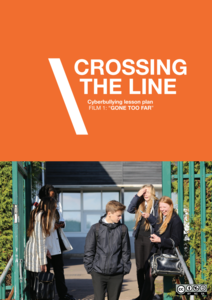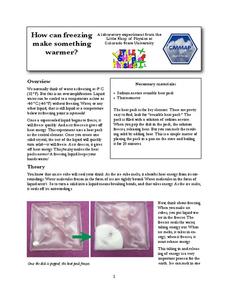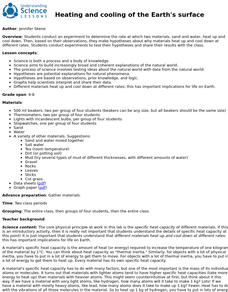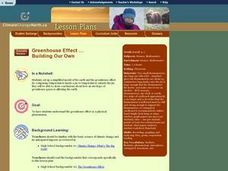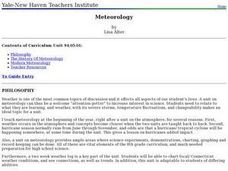Thermometer Teacher Resources
Find Thermometer lesson plans and worksheets
Showing 1,112 resources
MinuteEarth
The Hottest Place on Earth
Where is the hottest place on Earth, and how can scientists prove it? The video discusses multiple methods for measuring the temperatures across the planet. Then it discusses the hottest places measured by each method and their accuracy....
NOAA
The Oceanographic Yo-yo
How does chemistry help deep-sea explorers? Part four of a five-part series of lessons from aboard the Okeanos Explorer introduces middle school scientists to technologies used in ocean exploration. Groups work together to analyze data...
Childnet International
Crossing the Line: Cyberbullying
Members of the LGBTQ community are more likely to be bullied online than their peers—and bystanders who do nothing can be as problematic as the bullies themselves. Middle schoolers explore ways to protect themselves and others on the...
Veritasium
Celsius Didn't Invent Celsius
This temperature scale brought to you by...Carl Linnaeus? Discover the true origins of the world's most popular unit of temperature with a video from Veritasium. Content includes the world's struggle with standard temperature...
Veritasium
What the Fahrenheit?!
Learn the story of the origin of the Fahrenheit temperature scale. As it happens, it is quite an interesting sequence of events. The episode of the Veritasium playlist explains the history of its creation and the significance of the...
Be Smart
What’s Really Warming the Earth?
More carbon dioxide exists in the atmosphere than ever in human history. An informative video introduces the topic of global warming as part of a larger playlist. It looks at possible causes such as Earth's orbit, Earth's moving axis,...
Colorado State University
How Can Freezing Make Something Warmer?
Crazy fact—freezing liquid actually gives off heat! Young scholars investigate the transfer of energy when liquids freeze using a chemical heat pack. The heat pack gives off heat as its liquid core freezes.
Colorado State University
How Does the Earth Cool Itself Off?
Where does all the heat go when the sun goes down? An interesting lesson has learners explore this question by monitoring the infrared radiation emitted over time. They learn that hot spots cool more quickly that cooler spots.
Science Matters
Plot Study
Small groups investigate plots of land to discover how abiotic and biotic factors interact. After recording their findings, scholars share observations with peers and self-reflect on the learning process.
Science Matters
Blubber Gloves: It’s All About Insulation
Instill the concept of adaptation with the help of Blubber Gloves—ziplock bags, shortening, and duct tape. Scholars discuss how animals and plants keep warm in polar regions, record their predictions, and try on their Blubber Gloves to...
Nuffield Foundation
How Much Energy Is There in Food?
People associate calories with food, but what is a calorie? Young scientists measure the number of calories in samples of food to better understand the concept. They test a variety of samples, take measurements, and compare their results...
Nuffield Foundation
Going up in Smoke
Don't let all your hard work go up in smoke. Pupils conduct an experiment to see the harmful effects of cigarette smoke. They observe how smoke changes the color of white wool and an indicator solution.
Kenan Fellows
Reading Airline Maintenance Graphs
Airline mechanics must be precise, or the consequences could be deadly. Their target ranges alter with changes in temperature and pressure. When preparing an airplane for flight, you must read a maintenance graph. The second lesson of...
Kenan Fellows
What Is Heat?
If objects have no heat, how do they can gain and lose it? Scholars experiment with heat, temperature, and specific heat of various substances. They create definitions for these terms based on their own conclusions to complete the fourth...
University of California
Heating and Cooling of the Earth's Surface
Scholars collect data from heating sand and water before forming testable hypotheses about why sand heats up faster. Afterward, they develop and run experiments to test their hypotheses.
American Museum of Natural History
What Do You Know About T. Rex?
There's so much to learn about dinosaurs. A 10-question quiz tests knowledge of the more detailed characteristics of the Tyrannosaurus Rex. As individuals complete the quiz, they better understand how fossil records helped define some of...
Curated OER
Measuring Temperatures
Fourth graders participate in a teacher-led discussion about temperature--hot and cold. Each group of students is assigned specific materials for their lab experiment. They record temperatures measured in their journals and then plot...
Curated OER
Greenhouse Effect ...Building Our Own
Learners explore the greenhouse effect. They set up a simplified model of the earth and the greenhouse effect. Students compare temperatures inside a jar to temperatures outside the jar. Pupils collect information and create a line...
Curated OER
Greenhouse in a Bottle
Young atmospheric scientists create models of an atmosphere with and without clouds to determine the effect of cloud cover on Earth's temperatures, as well as figuring out whether dark or light surfaces absorb more energy. You may wish...
Curated OER
Book Week Celebration
Learners discover the importance of reading. They participate in a school wide book celebration. They participate in activities to get them interested in reading.
Texas State Energy Conservation Office
Investigation: Greenhouse Effect
Pupils compare the temperature change in a closed and open box as a demonstration of the greenhouse effect.
Curated OER
Manufacture of Ground Beef
Students study the proper temperature and technique to cook ground meat safely. They examine the critical control points when ground beef is being processed.
Curated OER
Meteorology
Middle schoolers research and produce an oral history that reflects the importance of meterologists in the lives of people in their community.
Curated OER
Degrees Of Meaning
Introduce the idea of a word and its synonyms having different degrees of meaning. Each individual chooses a word that he or she wants to work with and fills out the included worksheet using a thesaurus. Consider having a word bank of...




